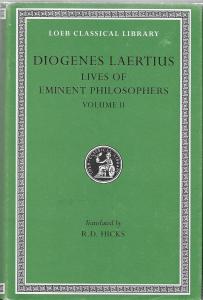
The world is in a state of upheaval at the moment, and we’re all looking for things to make us feel less anxious. Maybe Classics can help.
Today’s interview is with Naoko Yamagata
Is there a source from the ancient world that you find yourself coming back to when you want to feel better?
The Philosophy of Epicurus.
When did you first come across this?
When I was sixteen, after both my grandmothers died within a month of each other and I became very aware of and scared of my own mortality.
Can you tell me a bit about the texts and their context?
Much of Epicurus’ works are lost, but some are preserved in Diogenes Laertius’s Lives of Eminent Philosophers (Book X in the Loeb edition’s Vol. II). Epicurus was a Greek philosopher who lived in the Hellenistic period (4th to 3rd century BCE) when democracy was lost and people felt they had less control over their lives. He opened a school in Athens which was, unique to the customs of much of the ancient world, open to men and women. The essence of his teaching is also expanded in Lucretius’s Latin epic, On the Nature of Things.

What is it about Epicurus’ work that appeals to you most?
It reassures you that death is not to be feared, because it has nothing to do with us while we are alive and when death comes we ourselves will not exist to feel it. He also advocates a stress-free life, teaching you how to keep peace of mind under any circumstances, being content with what you have got and valuing friendship. Contrary to what later became known as ‘epicureanism’ of small ‘e’, synonymous with excessive pursuit of pleasure, the original Epicureanism with the big ‘E’ is about controlling one’s fear, desire and other negative feelings that cause stress, and being content with life as it is, which arguably is the fail-proof pursuit of happiness. It has much in common with Buddhism as well.
And finally… what do you do, outside of Classics, to cheer yourself up?
Nothing much, because Classics is my hobby and reading about various classical authors is what keeps me happy most of the time. I do like sitting in the garden and admiring flowers as well, but that is also following in the footsteps of Epicurus whose school was known as the ‘Garden’!

Naoko is teaching Classics at the OU. She fell in love with Greece when she read a book called “Classical Greece” by Maurice Bowra when she was fourteen and has been learning about the Greeks and Romans ever since. She never looked back!

Lovely thank you – and probably a good read for dealing with the current Coronavirus situation.
Having run screaming from Philosophy most of my life, I am suddenly finding it intertwining more with my interests, Seeing chunks of Plato’s Republic in the Assemblywomen by Aristophanes and the tone of the Comedy (it isn’t happy) I can see the anguish and loss to the Athenians and a feeling of desolation, so it is not surprising therefore that this approach to life would have been both relevant and necessary.
Thank you again.
LikeLike
I’ve read a bit here and there and I do think that Epicurean philosophy is very reassuring. Whether you embrace it or not, it’s relevant in so many ways.
LikeLike